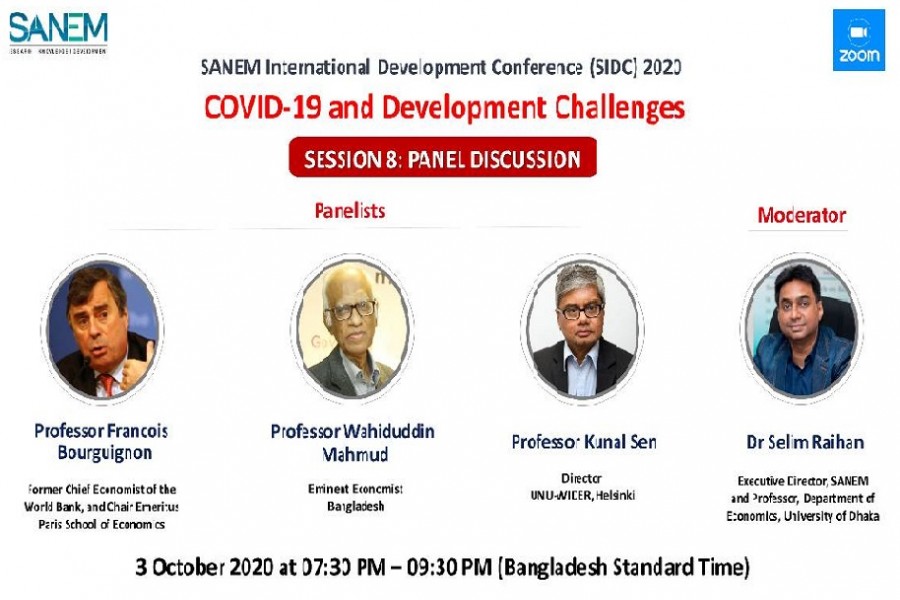Abu Taher Bappa
Published:2020-10-04 16:19:46 BdST
Sanem conference calls for inclusive policies to emerge out of pandemic
Speakers in a series of webinars organised by the South Asian Network on Economic Modeling (Sanem) underscored the need for more inclusive policies for developing countries to resolve the problems created by COVID-19 pandemic.
They made the call during the webinars held over three days under the banner of the Sanem International Development Conference (SIDC) 2020, where the overarching theme this year was fittingly "COVID-19 and Development Challenges."
"Closing borders is not the solution to the pandemic for developing countries as borders are crossed informally. So, more inclusive policy is needed," said Eleanor Wiseman, PhD student of Development Economics at the renowned University of California, Berkeley in USA, presenting a keynote paper on "Trade, corruption and COVID-19: Evidence from small-scale traders in Kenya."
A total of 24 papers by researchers from different countries, on the themes of macroeconomic challenges, international trade, public health, and health care services, education, labour market, employment, remittances, migration, poverty, inequality, and social protection, concerning the COVID-19 Pandemic, were presented in the conference.
The convener of the conference and Executive Director of SANEM Professor Selim Raihan said, "There are reasons to be sceptical about the effectiveness of restrictions in curbing people's mobility in LDCs. Capacity of the state and people's compliance have to be taken into account in this regard."
Dr Dushni Weerakoon, executive director, Institute of Policy Studies of Sri Lanka, said, "We are still in the process of understanding the transmission channels of the effects of COVID-19 since the impact began with supply side shocks and rapidly changed into stronger demand side shocks."
Dr M. A. Razzaque, research director of Policy Research Institute of Bangladesh, said, "As growth and private sectors have been hit hard, it is important to question the next source of investment for the domestic economy."
Dr Selim Jahan, former director of UNDP's Human Development Report Office, UNDP, said, "It is important to realise how we can deal with the future institutional challenges with the institutions already in place."
He also added the issues of transparency, accountability and trust are very much pertinent in dealing with the COVID-19 Pandemic, because this is not only a public health issue and it is an issue of political economy.
The last paper of the session, titled "Examining the economic impact of COVID-19 in India through daily electricity consumption and nighttime light intensity," was presented by Dr Sebastian Franco-Bedoya, Research Analyst at the World Bank headquarters in Washington D.C, said electricity and nighttime light intensity can serve as proxy data for data of economic activities in India in near real time.
Dr Bazlul Haque Khondker, professor of Economics at University of Dhaka said, "Due to lack of governance in health sectors of LDCs and developing countries, they might not be able to absorb additional inflow of funds, even if invested."
Unauthorized use or reproduction of The Finance Today content for commercial purposes is strictly prohibited.


